‘When in doubt, deliver water’
Two expat women, one Palestinian and one Israeli, created a pop-up nonprofit to build toilets and send other supplies to Gaza
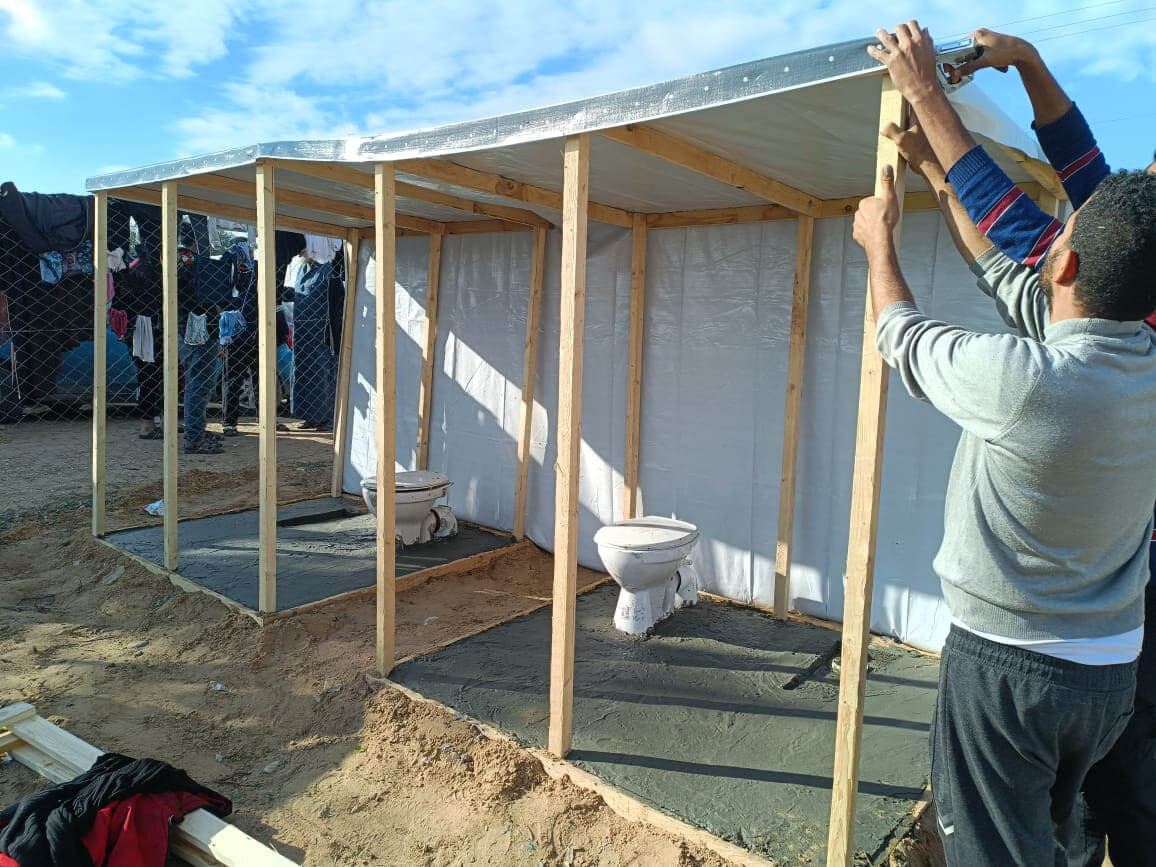
Clean Shelter, a pop-up nonprofit started by two expat women in Germany — one Palestinian and one Israeli — built 229 toilets in Gaza tent camps last year. Courtesy of Clean Shelter
This is an adaptation of our editor-in-chief’s weekly newsletter. Sign up to get it delivered to your inbox on Friday afternoons.
When Seba Abudaqa, a Palestinian who grew up in Gaza, moved to Germany a few years ago because of her husband’s job, she adopted a simple mantra: When in doubt, learn German.
If Abudaqa felt lonely or missed her family, she’d whip out her smartphone and open Duolingo (she has a 966-day streak). If she felt uncertain about work, she’d practice new vocabulary. Amid problems that felt overwhelming, it steadied her enough to take the next step forward.
Since the Oct. 7 Hamas terror attack on Israel and the devastating war it spawned in Gaza, Abudaqa has adapted the mantra: “When in doubt, deliver water,” she tells herself now, “because people need it all the time.”
And that’s exactly what she has been doing through Clean Shelter, the pop-up nonprofit she created with Tom Kellner, an Israeli who lives in Berlin.
More than 1,600 cubic meters of clean drinking water last year, to be precise, serving about 3,000 families displaced by the fighting. Plus: 229 toilets and 642 tents for the makeshift camps too many Gazans have lived in for too many months.
Clean Shelter also sent 1,000 blankets, 3,000 winter coats for kids, 4,000 sets of lice-treatment shampoo and combs, 5,000 hygiene kits and 48 cans of baby formula to Gaza in 2024, “all thanks to a total of 2,206 donations,” as Abudaqa and Kellner wrote in their annual report.
“When I don’t know what to do, I just learn German,” Abudaqa shrugged in our Zoom conversation this week.
“This is a lifestyle or a life value,” she explained. “Sometimes, I’m just stuck, and I don’t know what to do. I’m hesitant, I don’t know where to start, I don’t know what is the right thing, so sometimes I am paralyzed. I learned to get something to do while I’m paralyzed, so the time is not wasted.”
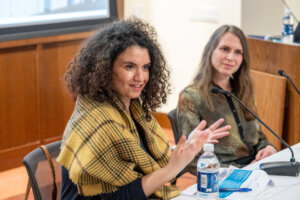
I met Abudaqa earlier this month in Los Angeles, where we both were honored as “trailblazers” by a group called NewGround: a Muslim-Jewish Partnership for Change. She wore a sundress with traditional Palestinian embroidery and electrified the crowd at the Skirball Center with her story.
There’s something about Clean Shelter’s scrappy, straightforward approach — deliver water, build toilets — that feels particularly inspiring and reassuring in this chaotic moment of apocalyptic-seeming challenges. Abudaqa and Kellner are not trying to solve the Israeli-Palestinian conflict. They’re trying to make sure women have a clean, private place to pee.
‘A drop in a sea of suffering’
They embody that oft-quoted Talmudic principle from Pirkei Avot (“Sayings of the Fathers”): Ours is not to finish the work, but neither are we free to desist from it.
“You can think of what we’re doing as just a drop in a sea of suffering that really doesn’t make much of a difference,” Kellner noted, “but you can also think of it more from the ground-up perspective, where you say, ‘OK, helping a couple of thousand families, that’s not insignificant.’”
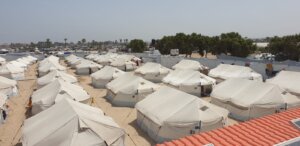
Abudaqa, who said she has more than 100 relatives and acquaintances who have been killed in the war — including 15 distant cousins after Israel resumed airstrikes last week — put it a little more colorfully. “Sometimes I feel I want to have four hands and five heads and do everything,” she said. “But I’m tired, sometimes. I cannot do everything I wanted to do, so I have to believe I’m just human.”
They are an interesting pair. Both 42, both expats, both feminists. Abudaqa grew up in Abasan al-Kabira, a village in Gaza’s southeast, the oldest of five siblings. She first left Gaza in 2001 to attend college in the West Bank, where she moved in 2006. She left for Egypt in 2011 and then Germany in 2022, and has worked for international aid groups like the Norwegian Refugee Council and World Central Kitchen.
Kellner, whose first name is Hebrew for “innocence,” was born in Haifa and grew up in a yishuv kehilati, or community settlement. She has a Ph.D. in literature and left Israel in 2015 with her husband and the first of their two children for a job at Germany’s Free University. “We were looking for a way out,” Kellner said.
‘Give them something to start with’
The two women met, poetically, on Oct. 8, 2023. It was the first meeting of a coexistence dialogue group for expats, organized by Neve Shalom/Wahat al-Salam, the Jewish-Arab cooperative village in Israel, and scheduled long before the terror attack. Seventeen Israelis and Palestinians from around the world were on the Zoom screen that day, each in their own state of shock.
“People tried to be very nice, super polite, good listeners, very patient with one another,” Kellner recalled. “People didn’t want to rock the boat. People also were careful with expressing too much of their position.”
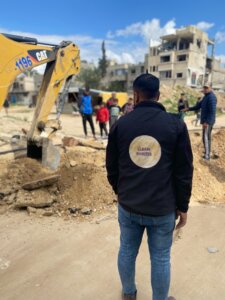
The group reconvened two weeks later, but Abudaqa quickly realized it was not the right thing for her at the time. “I was too emotional and I couldn’t be patient to listen,” she explained. “I just left, I told them, listen, this is not going to go anywhere, I have a lot of work to be done.”
She was already scrambling to send whatever help she could to relatives and friends in Gaza. Kellner sent what Abudaqa described as a “solidarity email,” and then a WhatsApp message saying she wanted to donate some money to Gazans.
“I was working with a friend — I collect donations and he distributes them around there in Gaza,” Abudaqa recalled. “Like, little money, like 50 shekels, 50 shekels means like $20 — ”
“Like $10,” Kellner corrected.
“We start at 50 shekels, some families we give 100 shekels, just to buy food for some days,” Abudaqa continued. “I know that many run away, escaped, without taking anything with them. We just wanted to give them something to start with or something to recover for few days.”
But, Kellner recalled, as the weeks passed, this seemed a little too scrappy for some donors.
“People are really afraid; there are a lot of scams,” she explained. “How do I know the money is going to the right place? How do I know it’s not going to Hamas? How do I know it’s not going to be stolen? When you give cash, it’s hard to explain your decision process. Why this family and not that one. We wanted something that could benefit more people.”
‘This is a woman’s problem.’
Abudaqa, meanwhile, was texting and talking with her mother, siblings, cousins and friends in Gaza about the situation on the ground. The big aid organizations were flooding the strip with tents. But there were not enough bathrooms and showers.
“It was very clear, really quite fast, that toilets are a huge issue,” Kellner said. “This is a women’s problem. Men can pee all over the place. Women can’t. Women need to take care of the elderly, women need to take care of the kids. So the whole toilet thing is a women’s issue. This fit Seba and me very well.”
It was also, she noted, “very straightforward.”
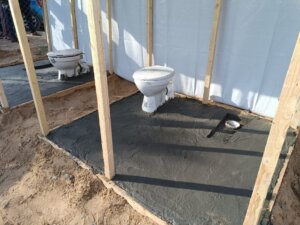
“I mean, you give a person the money, they pour concrete, put around some sort of fabric — it was very, very primitive at first, it was kind of like a do-it-yourself thing,” Kellner continued. “But it was very easy to do; it’s easy to document, it’s easy to show people photos of what was done with their donation. So we felt it’s a great way to start.
“We literally said, you know, we’re just going to build a couple of toilets in Rafah, and that will be great. And then what happened is we got so many donations that we could do much, much more than just a couple of toilets. And the more we did, the more donations we got.”
A total of 2,512 donations as of yesterday, each listed in a simple Google Doc. They got $8,000 from a feminist foundation, but most of the money is from individuals, some of whom have given a dozen or more times, and in smallish increments. Virtually all of it goes directly to Gaza — 134,000 euros, or about $145,000, was transferred in 2024, the women said, and 96,000 British pounds, or about $124,000, so far this year.
They registered as a nonprofit in Germany last February to avoid a major tax hit, and have since hired a couple of local Gazans to coordinate operations on the ground. The name “Clean Shelter” came from an AI chatbot.
“I put what we do and the AI proposed many things,” Abudaqa said. Kellner liked “Clean Shelter.”
“I thought it’s vague enough, you can put a lot of things under it, and the associations that it raises are very good,” she explained. “First of all the cleanliness, and second of all, the concept of shelter. The thought was: This is not a home. We don’t assume that people deserve to live in tents as their homes, but this is a sort of a solution that has to be respectful and convenient for them.”
‘We have the same goal, even if we don’t agree on how to get there.’
I asked the women if their respective communities had any issues with what they were doing. Did Abudaqa face criticism for partnering with an Israeli? Did Kellner for working with Gazans rather than the families of Israeli hostages held by Hamas?
Of course, they said — and: who cares.
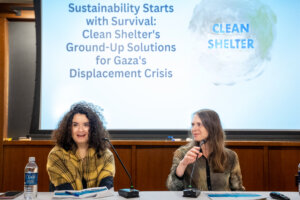
I asked why not direct donations to and work with a larger aid organization better equipped to tackle the enormity of the problem. Clean Shelter can fill gaps left by such organizations, they noted, and with no bureaucracy — they don’t even have a board of directors — can respond to a need in Gaza within hours.
I asked what they fight over. Not politics, they said; little things, like the layout of the website.
“We don’t have major disagreement,” Abudaqa said. “We argue sometimes, because we are different people at the end, we have different experiences to reflect when we are doing something.”
Kellner invoked a Hebrew phrase meaning “getting stuck in a corner” and said Abudaqa had “taught her this technique of sleeping on it” — by the next day, they’ve often forgotten why they cared so much.
“We’re both pretty hard-headed people,” Kellner said. “We have the same goal, even if we don’t agree on how to get there. This is one of the things that makes it much easier for me to let go, or compromise. Sometimes I feel it’s not that important; what’s important is the water reaches the people.”
When in doubt, learn German.
Correction: The original version of this article misidentified the discipline of Tom Kellner’s Ph.D. and the name of the institution where she first worked in Germany. Her Ph.D. is in Hebrew literature, not comparative literature, and it was the Free University, not the Open University.
















